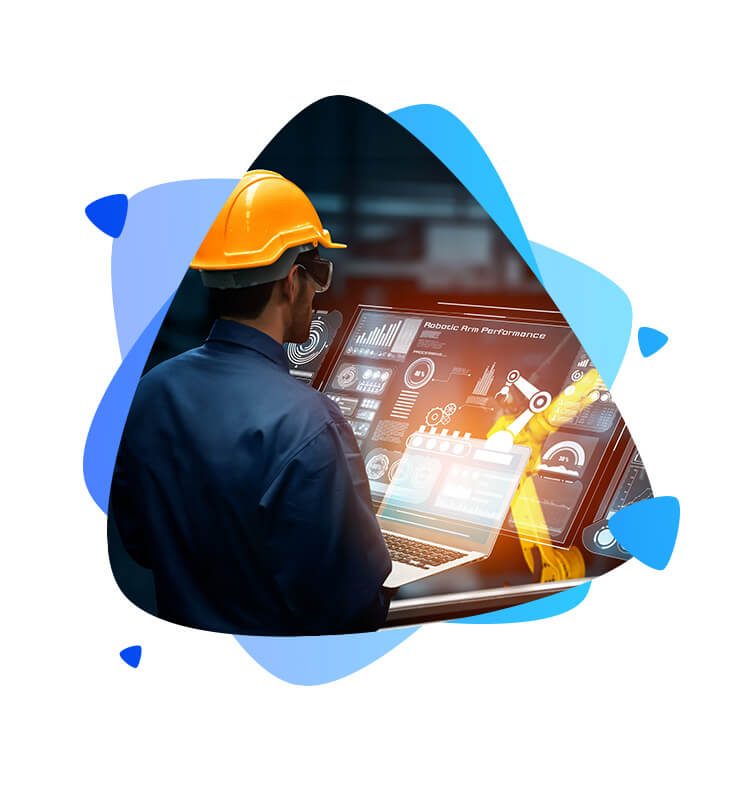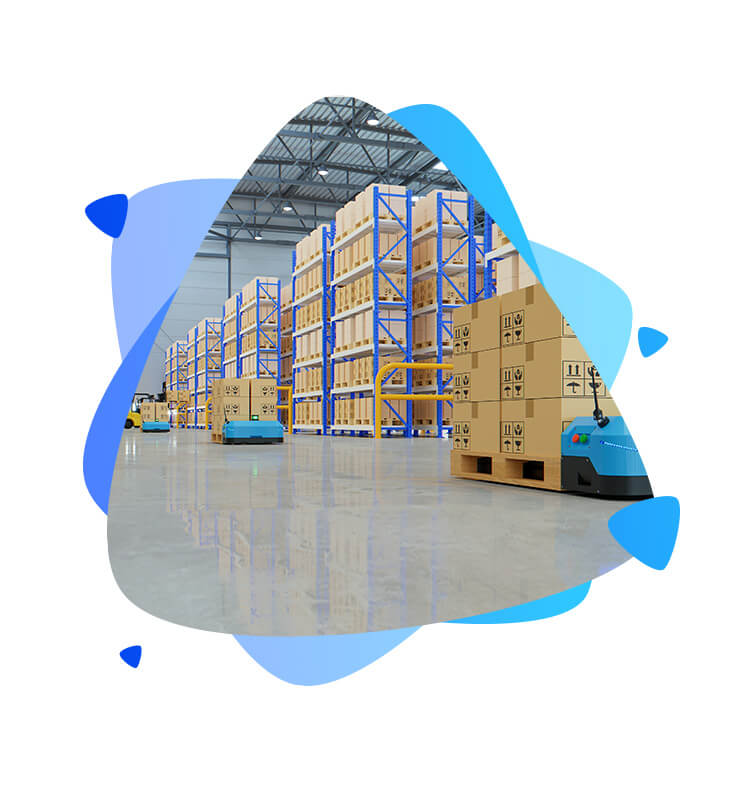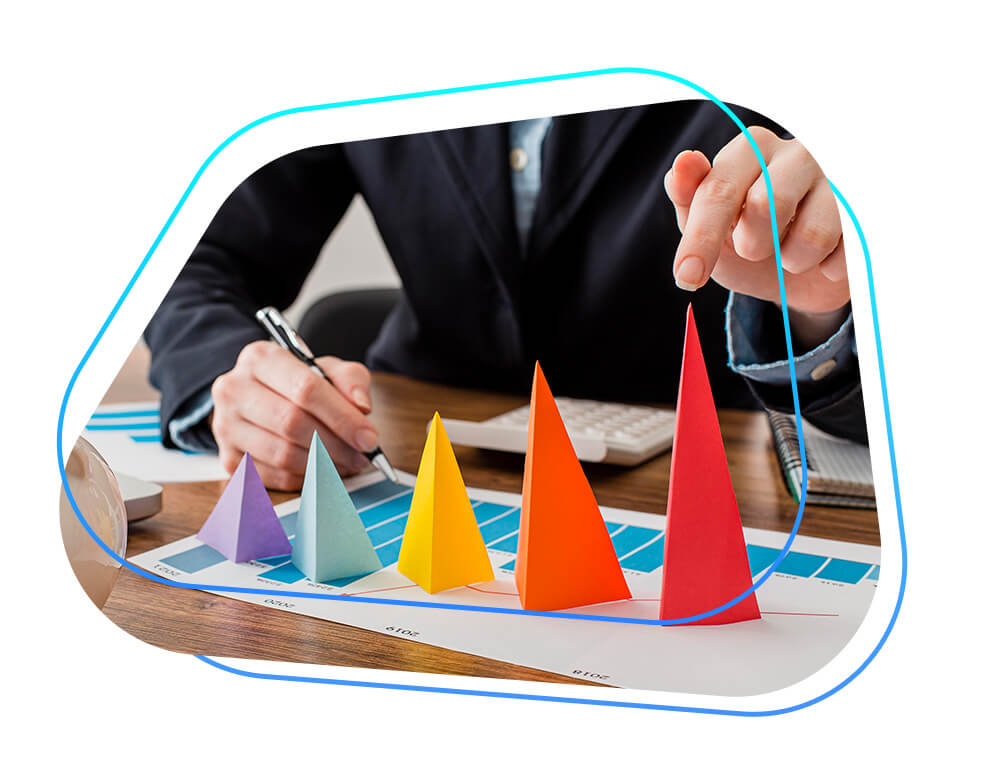What Is ERP?
This page is your go-to resource for understanding ERP software. If you're seeking guidance on selecting the right one for your business
Talk to Our ExpertsEnterprise Resource Planning or ERP is a process of using technology to connect all departments and functions within an organization into a unified system and enable data flow between them. An ERP software is designed to automate the sharing of information, avoid the duplication of data, provide data integrity and facilitate informed decision taking. All-in-all, it is an advanced technology enabled system that serves each department's specific needs, while making business management a hassle-free affair.
An ERP system could be ineffective unless carefully implemented. Improper implementation can also lead to failure rather than profit for businesses. Successful ERP implementation is one of the key factors in getting quick ROI.
ERP is an integrated suite of applications capable of delivering operational excellence and enabling future business growth. The tool shares a common database for all departmental operations in an organization, covering finance and accounting, sales and marketing, HR, manufacturing, distribution, inventory, customer relationships, supply chain, warehousing and more.
The term ERP was first used by the Gartner Group in 1990. Back then, it was referred to as, “systems having capabilities to help manufacturing companies better handle their material requirement planning and problems related to demand or supply.”
The earliest ERP systems consisted of software programs capable of integrating with other smaller systems, used within a single platform in different departments of a company.
ERP systems experienced rapid growth as computer technology grew. They were originally used to automate only back office tasks which had no direct effect on customer relationships. However, with the concept growing stronger, ERP software started getting more capable to handle all business activities, including those operated in the front office.
Later, by the twenty-first century and with the advent of the internet, ERP technology has progressed greatly. The conventional models of ERP software that used physical servers transformed into cloud-based ERP systems that allow users to access the database remotely.
Today, ERP's capabilities have expanded and sufficiently comprehensive to manage any critical organizational operation, regardless of the size of the business or industry to which it belongs. ERP solutions have now become an indispensable part of any organization helping them to keep their business running smoothly and efficiently.
ERP systems enable automation of administrative and other business operations functioning across industries, including multiple lines of businesses. ERP's most defining aspect is the centralized database, which basically separates such integrated systems from a targeted stand-alone software.
Companies can get rid of double-entry errors, improve communication, achieve information uniformity and organizational accuracy with the help of ERP software. Its real-time dashboard monitoring functionality also allows users to access data on business performance easily, at any time.
The intrinsic characteristic of any ERP program at its most basic level is to combine complex functions conducted in multiple departments into one framework. ERP systems streamline business processes and information across the entire organization, remove barriers that existed between departments and make corporate data easily accessible.
In addition to providing department-wise synchronization, ERP software also automates and simplifies daily business processes. ERP systems also include multiple modules, each of which is typically designed to focus on maintaining workflow of a specific business area. Unlike standalone business management systems in which information is manually entered to generate consolidated reports, an ERP solution allows employees to generate any report automatically from a single system, without any additional effort. Other ERP offerings include interactive dashboards to help the staff easily and swiftly understand business performance based on key metrics, in a single glance.
The main purpose of implementing an ERP system is to boost business efficiency and profits through proper utilization of resources and human capital. Whether it is time, capital, personnel or any other aspect, if you can minimize the materials and other resources that are being used, without sacrificing quality or efficiency, then your business would witness growth more quickly and sustain it with ease.
ERP software is a powerful tool to help businesses control their finance, human capital, sales, production, and other business areas. It incorporates reports and metrics from multiple departments and makes them accessible on a single platform. This makes it easier for businesses to get a complete overview of all departmental processes and resources that are being used. The management can use the key insights to enhance the quality of decision making and improve resource planning, a much-needed trait for a business to generate higher growth and good returns.
In comparison, the lack of an ERP system leads to imbalanced resource planning and improper distribution, resulting in underperformance and failure.
In today's complex business world, it is quite impossible to ignore the impact of an ERP system. Because all organizational data and processes are managed through ERP systems, enterprises can integrate different departments and improve the overall workflow, resulting in significant savings.
The primary objective of implementing an ERP system is to bring business benefits as detailed in the following:
by improving information sharing across the business functions
with reports generated through real-time data
with streamlined business processes and a defined allocation of resources
with the same look and feel of the software for both back and front office activities
with advanced operations tracking and management features
with intuitive software architecture and exceptional user experience
with multiple level access permission and controls
Based on the size of the organization, the industry it is used in and the technology it uses, ERP systems are broadly categorized into three types.
While ERP systems can manage any business operation, the requirements of a large and medium-sized enterprise are never the same, even if they belong to the same industry vertical.
ERP for medium-sized businesses are applications that are scaled-down models designed with fewer or only relevant features and are more cost-effective.
Traditional ERP systems require physical servers and hardware installation on a company's premises.
Unlike these, in cloud-hosted or web-based deployment models, the program is hosted on remote servers, making the information stored in it more accessible to users. Employees can freely use the ERP systems from anywhere and on any device that has an internet connection.
Unlike one-size-fits-all, the latest ERP systems are tailored with functionalities to support the organization's specific, unique needs.
These ERP applications ensure quick business process optimization and quicker adaptation to changing market demands.
With the right ERP systems in place, users have access to accurate business information, which enables them to make quicker decisions, eliminate redundant processes and lower the overall operating cost. Businesses can choose the implementation methods of their ERP software according to their specific organizational requirements. It is divided into three different modes: cloud, on-premise and hybrid.
The cloud ERP systems can be either private or public. The online IT resources are made available through public cloud ERP systems by external service providers. Companies using the service would only have to pay the fee for the resources used. In private cloud ERP systems, IT resources are owned by the organization and can be accessed only by its employees. Both provide excellent means for quick ERP deployment, with cost advantages.
On-premise ERP systems run applications on servers that are set up in the organization's premises. Companies using an on-premise ERP solution have direct control on the operations and maintenance of servers and storage. This requires higher investments in terms of expenses and resources spent on their upkeep.
A hybrid ERP is a combination of both cloud and on-premise systems. Organizations using a hybrid ERP system can continue to operate critical business data under their control, in their own data centers. At the same time, they can also gain advantages in storing massive data volumes through a flexible and scalable cloud ERP system.
AUTOMOTIVE
Comprehensive applications for auto dealers, car rentals, leasing and garage owners to ensure high-quality customer service, inventory and delivery management with marketing and labor efficiency.
Start exploringMANUFACTURING
Robust software for manufacturing plants and units. Designed to improve efficiency, integrate processes and increase agility in operations.
Start exploringWAREHOUSING & LOGISTICS
Proven warehousing solutions for flawless order fulfillment and on-time shipments. Equipped with centralized systems to provide easy monitoring and reduction of processing time.
Start exploringBUILDING & CONSTRUCTION
Multipurpose applications to facilitate progression tracking of real estate sales, leasing, construction, other operations to manage assets effortlessly.
Start exploringEDUCATION
Specially designed IT systems for the management of schools, colleges and universities to automate admissions, fee payments, course/ program and staff schedules.
Start exploringWHOLESALE & DISTRIBUTION
Multi-functionality software applications equipped with tools to monitor sales, supply chain, packing, shipping and other order fulfilling activities.
Start exploringRETAIL
Customizable solutions for retail establishments. Equipped with specific modules for accounting, procurement, planning, budgeting, reporting and much more.
Start exploringThis module enables businesses to manage every aspect of financial transactions, both inflows and outflows. The tool tracks all monetary transactions of a business such as expenditures, ledgers, bank statements, budgeting, payment, etc., allowing users to access any data with ease.
The Customer Relationship Management (CRM) module in an ERP system helps organizations manage customer data and transactions more effectively. Using this module, businesses can enhance their customer service and build strong business relationships that would result in more sales.
Human capital management (HCM) module helps the HR team to record, track, and manage employee information related to their performance, job skills, attendance, payroll, payment reports, reimbursement and more.
The production module includes material requirements planning (MRP) features that are a major prerequisite for the manufacturing industry. It enables organizations dealing in production to outperform their competitors while meeting the highest manufacturing standards.
The sales module has multiple features including sales queries, inquiry analysis, quotation drafting, accepting and handling sales orders, drafting invoices and other activities that support faster lead conversion while enhancing future opportunities for lead generation.
The inventory module keeps track of all stocks and traces their current location in the warehouse or stores. This module enables warehouses to optimize inventory and reduce wastage of space. Although best suited for retail and warehouse management, it has uses in many other industries.
The supply chain management module ensures businesses experience a hassle-free flow of products from manufacturers to consumers. It is typically used by suppliers, manufacturers, distributors, warehouses, storage facilities and retailers.
The important characteristics of quality control management module in ERP systems include high quality, commitment, quick response, decisions based on data, employee participation and an efficient quality management culture to transform your business and build a well-organized structure.
ERP systems can structure all business processes in the most effective way possible. They promote the sharing of information, allowing each department to communicate effectively and enhance the credibility of the information.
ERP systems also provide business intelligence tools that enable real-time reporting, a much-needed feature for informed decision-making and predictions of future challenges that an organization may face.
ERP solutions have greatly evolved ever since they were introduced decades ago. Today, ERP systems are witnessing new technology trends and have grown into scalable, versatile and multi-faceted tools that businesses of any size and industry can leverage in order to improve and enhance their performance.
Following are some of the new ERP software trends:
ERP systems are available now on mobile phones. Employees get access to reports in real time and can access dashboards anytime, anywhere.
The benefits of cloud ERP systems are becoming evident across all industries. Business information is stored in remote servers which employees can easily access, irrespective of their geographical location or the device they are using.
With its increasing reach, social media and its integration with ERP would enable users to access a wealth of data related to prospects and clients, that is already stored on social platforms. This would assist the company in managing customer relationship and sales.
Two-tier ERP systems are used by larger organizations, functioning in multiple geographic locations. In this, two integrated ERP systems run simultaneously. One system is deployed at the corporate level and the other is managed at the subsidiary level.
For a business that is growing constantly, you need to make sure the ERP systems can sustain its expansion. In other words, you need to identify the ERP system that is best for your business, considering future expansions and growth opportunities. Here are some of the fundamental factors you need to consider while choosing an ERP software:
Organizations need consolidated information from different departments to get the complete business overview required for decision making. Multiple departments produce multiple sets of reports, all of which need to be consolidated. Doing this manually is both time-consuming and can lead to mistakes. Integrated ERP systems simplify restructuring and reduce errors in reporting.
Another key consideration for any company that operates internationally is whether the ERP system is capable of handling multiple currencies and complies with tax regulations. The right ERP software would demonstrate these capabilities efficiently. The system provides multi-currency support and responds instantly to changes in local tax regulations.
The best ERP systems standardize business processes through a centralized interface, thus providing greater access to organizational data. This helps companies monitor, handle and have greater control over all departments and processes.
Every ERP system needs to be customized to suit specific business requirements and objectives. It enhances the efficiency of the ERP system in providing simplification in operations, seamless mapping of business processes and meeting the reporting requirements.
Scalability is the capability of an ERP system to support the increasing volume of operational data or business growth. It's an essential quality that allows users to easily set up new business processes and streamline them to maximize productivity.
Cloud ERP systems on the market are relatively new because businesses already use on-premise systems. In such cases, there is a lot of data stored in the legacy systems that cannot be moved into the new system instantly.
A best suited ERP solution ensures co-existence and synchronization between on-premise and cloud systems. This two-tier implementation would help businesses to continue using their existing software while getting introduced to agile cloud systems for new divisions, without disrupting ongoing processes.
Organizations should have the choice in today's digital age to make timely, informed decisions about how to adapt, make improvements and implement new strategies. They also need to be able to effectively manage and monitor what works and what does not work for them, to re-allocate resources for better returns.
Next-generation ERP systems leverage emerging technologies in order to keep up with the latest trends, such as driving operational productivity and business development through AI, IoT, Machine Learning Automation and Blockchain. Increasing customer expectations and industry competitiveness has also begun pushing companies to pursue innovation and accept digital transformation.
Whether you're a mid-sized business owner looking for a cloud-based ERP solution to improve productivity, or a large business that needs to support and grow all-round business development, our AI-powered ERP systems are designed and developed to help your business thrive.
Get in touch with our industry experts at [email protected] today and get more information.
Email us now










